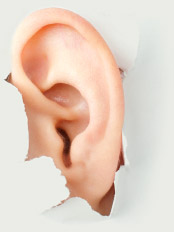Tinnitus causes, symptoms and relief
Posted in General Health & Wellness on October 18, 2011. Last modified on January 30, 2018. Read disclaimer.
 Often thought of as an ever-present ringing in the ears, the definition of tinnitus is much broader than this: some people hear ringing while others hear buzzing, whistling, roaring, clicking or hissing. The incessant sound may range from a low roar to a high-pitched squeal -- effecting either one or both ears. The resulting discomfort can range from a minor, occasional irritation for some to loud, never-ending, sleep-disrupting, emotional turmoil for others.
Often thought of as an ever-present ringing in the ears, the definition of tinnitus is much broader than this: some people hear ringing while others hear buzzing, whistling, roaring, clicking or hissing. The incessant sound may range from a low roar to a high-pitched squeal -- effecting either one or both ears. The resulting discomfort can range from a minor, occasional irritation for some to loud, never-ending, sleep-disrupting, emotional turmoil for others.
Tinnitus is relatively common
1 in 10 adults will experience tinnitus that lasts longer than 3 months while more than half of the population may have intermittent symptoms. Actually, tinnitus is not a disease in itself, but a condition where the brain's auditory system becomes disregulated: nerves in the ear fire inappropriately, producing the illusion of sound where there is none.
+ Free Shipping & Returns on Eligible Items.
(*Amazon's Top 100 list updated hourly.)
Much has yet to be learned but possible triggers of tinnitus include:
- Ear problems: This includes middle ear infection, fluid, or even excessive earwax.
- Drugs: Over 200 medications have been associated with tinnitus including certain painkillers (such as aspirin and ibuprofen), antibiotics, diuretics, epilepsy drugs and cancer treatments. In addition, some people experience tinnitus primarily when starting or stopping medications.
- Disease: Certain diseases such as Meniere's disease, which also causes dizziness; and age-related hearing loss may be associated with tinnitus. A benign nerve tumor known as acoustic neuroma may also a common cause.
- Age and/or age related hearing loss: This condition is more common in people over the age of 65.
- Exposure to loud noise: tinnitus that appears after short-term exposure to loud noises usually is only temporary. Long-term exposure to loud noise, however, can result in permanent ear damage and more persistent tinnitus.
- Brain or ear injury
- Emotions: stress and depression may aggravate symptoms.
- TMJ disorder: A condition affecting the joint where the lower jawbone and skull connect.
- What you drink: coffee, soda and alcoholic drinks (especially red wine) can be possible triggers.
- Allergies: If you notice that antihistamines relieve the symptoms of tinnitus, that's an indicator that nasal congestion and fluid buildup from allergies may be at the root of the problem.
- High sodium diet: salt can effect fluids in the ear.
Although usually not a symptom of a serious condition, it's important that tinnitus be diagnosed and treated properly. There is no cure at this time but treatments are available that may help one to cope with the phantom sounds that are characteristic of tinnitus.
Depending on the severity, frequency, believed cause or type of tinnitus (constant, intermittent or pulsating), possible treatments include:
- Niacin: This nutritional supplement may provide mild relief for some, but it also can cause problematic "flushing" of the skin.
- Medications: A 2005 study in Brazil using acamprosate (Campral), a drug used to treat alcoholism showed a nearly 87% rate of relief of tinnitus symptoms. US studies of this drug are currently being conducted.
Anti-depressants and anti-anxiety medications may help someone with tinnitus relax, so they can fall asleep despite the noise. - Sound generators: One type goes in the ear and produces a soft, pleasant sound, helping to drown out the tinnitus sound. Table-top white-noise sound generators or even a simple room fan may help a person with tinnitus to fall asleep.
- Hearing aids: some devices may help those who have lost hearing due to tinnitus.
Tinnitus and Military Service
According to the ATA (American Tinnitus Association), Tinnitus is the most common disability effecting military personal and veterans. National Institutes of Health (NIH) studies indicate that noise and blast related damage to related areas of the brain and ear -- and especially to those suffering PTSD -- may contribute to tinnitus. More information about the NIH study can be found at http://clinicaltrials.gov/ct2/show/NCT01177137.
Prevention of tinnitus
Avoid loud noises and head injuries, such as those associated with:
- Wearing ear-buds (in-ear earphones) and listening to loud music.
- Participating in activities (such as "heading" the ball in soccer) that put one at risk for mild traumatic brain injury (TBI).
- Not wearing a seat belt
If you've had the symptoms of tinnitus for more than one week or if dizziness or hearing loss accompany the onset of tinnitus, consult with a doctor who specializes in diseases of the ears, nose and throat (otolaryngologist).
For more information on tinnitus causes, symptoms and relief, visit:
Woman's World magazine, October 10, 2011

